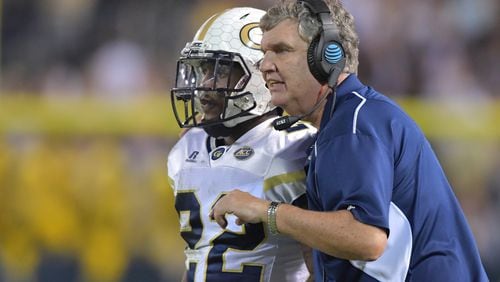Georgia Tech coach Paul Johnson wasn’t happy with his defense last season, to the point that a change was necessary with defensive coordinator Ted Roof. That doesn’t mean he was passing out cupcakes to celebrate his offense’s performance, though.
“We’ve got to be better in all facets,” Johnson told the AJC. “We weren’t very good on offense, either. We were spotty.”
As the Yellow Jackets prepare for the start of spring practice Monday, Tech does have reason to believe that improvement is entirely attainable. Tech returns 10 players who started at least six games, including quarterback TaQuon Marshall and Tech’s two All-ACC selections, B-back KirVonte Benson and guard Parker Braun.
Last season, Tech ran for 400 yards in four games, a first in Johnson’s 10-year tenure. But the Jackets had trouble moving the ball consistently, especially via the pass. Tech’s yards-per-play average, 5.75, was the lowest of Johnson’s tenure and just the third when it was under 6.0. The other two – Johnson’s other two losing seasons, 2010 and 2015.
In their final six quarters – the second half of a 43-20 loss at Duke and a 38-7 loss to eventual national runner-up Georgia – Tech scored seven points and averaged 4.0 yards per play. The Jackets finished 5-6 and did not qualify for a bowl for the second time in three years, but only the third time in Johnson’s 20 seasons as a head coach that his team didn’t reach the postseason.
“We just didn’t play that well, and we had a lot of young guys,” Johnson said. “You had a brand-new quarterback, a brand-new B-back. People tend to forget we had the one kid coming back, and he got dismissed right before fall camp. He might have been the best player on the team.”
Johnson was referring to B-back Dedrick Mills, who was dismissed from the team midway through the preseason. Mills made multiple award watch lists and was expected to be an engine for the Jackets offense. His replacement, Benson was something of an unknown as a third-year sophomore, having not played a single snap at B-back as a redshirt freshman. Likewise, Marshall had played 14 snaps at quarterback as the third-stringer behind Justin Thomas and Matthew Jordan. Both ran for 1,000 yards last season.
“While KirVonte played pretty good – he had over 1,000 yards – I would venture to bet he’ll be better this year with the experience,” Johnson said. “Jerry (Howard) will be a year older. We need to play better at slotback. We need to get more out of those guys.”
A-back Clinton Lynch had a down season as a junior. Lynch was exceedingly effective as a freshman and sophomore, when he gained 1,635 yards of offense on 112 touches, a 14.6 yards-per-touch average. He scored a touchdown once every seven touches. As a junior, Lynch had 31 touches for 252 yards (8.1 yards per touch) and failed to score. Lynch had missed the previous spring practice because of a knee injury and then missed time in the preseason with a separate leg injury.
“I think he was hurt most of the year,” Johnson said. “He started the season hurt, and he just never really did get healthy.”
Johnson has mentioned the idea of having bigger players at A-back to aid in blocking. B-back Jordan Ponchez-Mason, a redshirt freshman, is a possibility. He is listed at 6-foot-1 and 205 pounds.
“We want to try to give him every opportunity to get on the field,” Johnson said. “He’s one of our biggest athletes in the skill positions, so we want to try to use him if we can.”
A high priority for Tech in the spring will be improving the passing game. With Marshall under center, Tech had a passer rating of 120.9, 100th nationally. It didn’t help that Tech played several games in heavy rains.
“When we’ve been good here, the offense has been really good so it could kind of (carry the team),” Johnson said. “We weren’t good enough last year to do that. I think we had to replace a lot of people. The spring’s going to be huge, trying to find a go-to receiver. We need to be way more consistent throwing the ball, in which case, if we get better at running the (ball), we’ll be better at throwing.”
Johnson praised Marshall’s ability to make something out of nothing, but said that consistency in his reads in the option game and in the passing game are the next step.
“He had a good year a year ago, but I think if you ask ’em, most guys would tell you it slows down a little bit the second year,” Johnson said.
Wide receiver Brad Stewart, who has been the No. 2 receiver behind Ricky Jeune for the past two seasons, is himself coming off a so-so season, one in which he caught four passes after catching 19 the previous season, and his hands were not as sticky. Jalen Camp is the most likely competitor to Stewart for the top spot.
“Jalen Camp played a good deal last year, and then we’ve got some young guys,” Johnson said. “Adonicas Sanders was a redshirt who I think has a good chance certainly. Steve Dolphus and Jair (Hawkins-Anderson) need to step it up, and then we’ve got some freshmen coming in. That’ll be a big emphasis this spring, to try to find three or four guys that fit there.”
Tech will have a full complement of offensive linemen in the spring, giving coaches a chance to foster competition. Johnson will try to develop a capable backup quarterback out of either sophomore Lucas Johnson or redshirt freshman Tobias Oliver.
“We’ve got pretty good depth there,” Johnson said. “I think we’ve got 15 offensive linemen on scholarship now, so we’ll kind of sort it out and try to get our best seven or eight in position where they can play.”
With a new scheme being put in place on defense, the Jackets may need to rely more upon the offense next season. Tech has 15 practices this spring to help restore the ways of a productive scheme that will be tested plenty once the season begins.
About the Author







